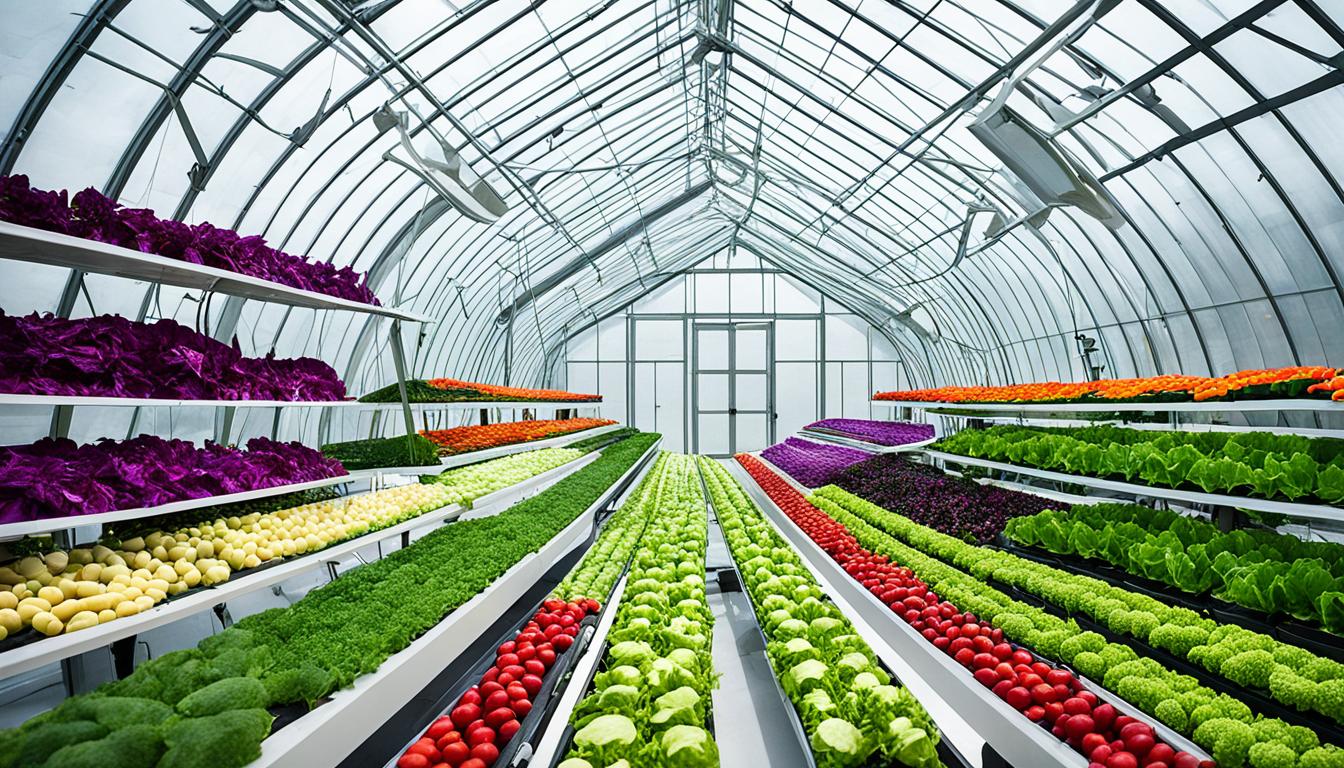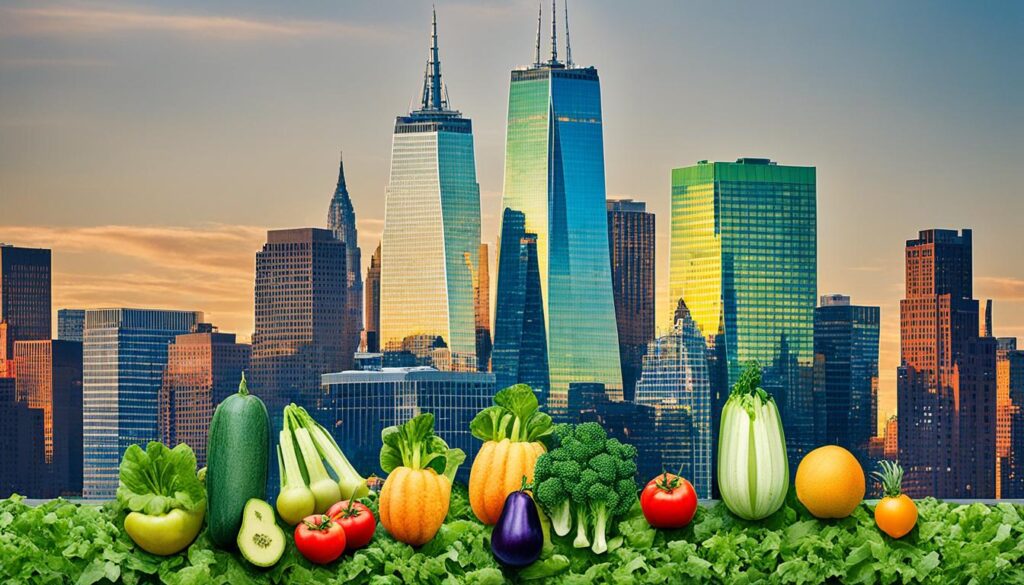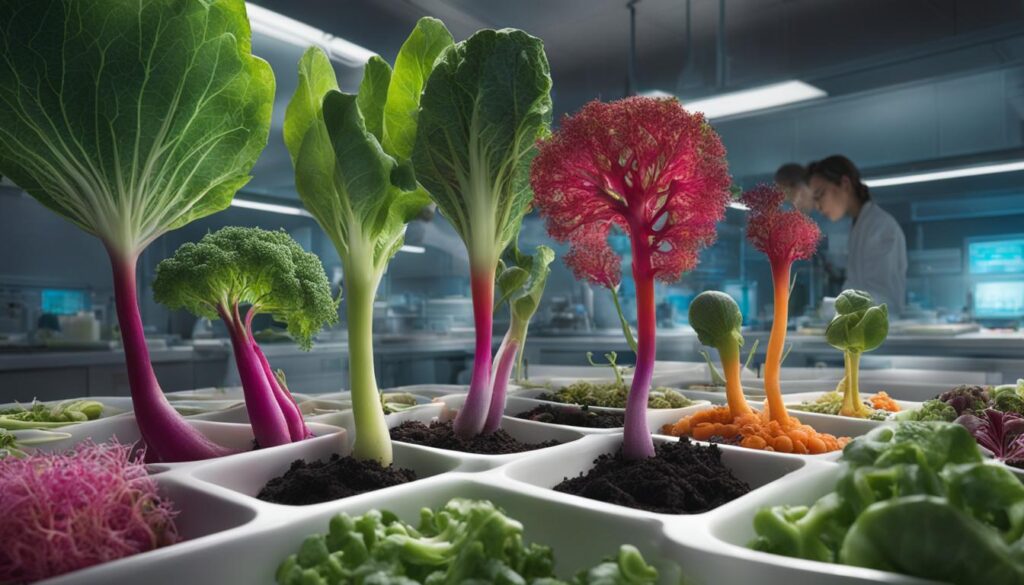Man-Made Vegetables: A Surprising List

Welcome to our exploration of man-made vegetables, where we will uncover the fascinating world of hybrid and genetically modified crops. These artificially created vegetables have been developed by humans through crossbreeding and genetic modification techniques to create new varieties with desired traits. Let’s dive in and discover the surprising range of man-made vegetables that exist today.
Key Takeaways:
- Man-made vegetables are the result of human intervention in plant breeding.
- Hybrid vegetables are created through crossbreeding different varieties of the same species.
- Genetically modified vegetables involve introducing specific genes into a plant’s DNA.
- Man-made vegetables play a crucial role in modern agriculture.
- The development and consumption of genetically modified vegetables have sparked debates and concerns.
Understanding Man-Made Vegetables
Before we delve into specific examples of man-made vegetables, it’s important to have a clear understanding of what they are and how they are created. Man-made vegetables are the result of human intervention in plant breeding, where different plant species are crossbred or genetically modified to create new varieties with desired traits.
Hybrid vegetables are one type of man-made vegetable. They are created by crossbreeding different varieties of the same plant species. This process allows breeders to combine desirable traits from each parent plant, such as disease resistance, yield, or flavor, and produce offspring with improved characteristics.
Another category of man-made vegetables includes genetically modified vegetables. These vegetables are created by introducing specific genes into a plant’s DNA to enhance desired traits. Through genetic engineering, scientists can create crops with increased pest resistance, drought tolerance, or nutrient content.
Both hybrid vegetables and genetically modified vegetables have been instrumental in expanding the range of vegetable varieties available to consumers. These man-made crops offer a wider selection of options that cater to different tastes, nutritional needs, and growing conditions.
The development of man-made vegetables has revolutionized the agricultural industry, allowing for the production of crops that are more resilient, nutritious, and visually appealing.
To provide a visual representation of the diverse range of man-made vegetables, here is a comparison table showcasing some popular hybrid vegetable varieties and genetically modified vegetable examples:
| Hybrid Vegetables | Genetically Modified Vegetables |
|---|---|
| Tomatillo | Papaya (Rainbow) |
| Broccolini | Squash (Zucchini) |
| Pluots | Corn (Bt Corn) |
| Kiwiberry | Potato (Innate Potato) |
As you can see, these man-made vegetable varieties offer unique combinations of flavors, appearances, and nutritional benefits that were not previously available in nature.
Why are man-made vegetables important?
Man-made vegetables play a crucial role in our food system for several reasons:
- Increased crop yield: Hybrid vegetables and genetically modified vegetables often have higher yields compared to their non-man-made counterparts, helping to meet the growing demand for food worldwide.
- Pest and disease resistance: Many man-made vegetables are bred or engineered to be more resistant to pests and diseases, reducing the need for chemical pesticides and promoting sustainable farming practices.
- Nutritional enhancement: Genetic modification techniques allow scientists to enhance the nutritional content of vegetables, addressing specific dietary needs and combating nutrient deficiencies.
In the next section, we will explore specific examples of man-made vegetables, showcasing the diverse array of hybrid and genetically modified crops available today.
The World of Hybrid Vegetables
Hybrid vegetables are the product of crossbreeding different varieties of the same species, resulting in exciting new creations. This selective breeding technique allows breeders to combine desirable traits from each parent plant, leading to offspring with improved characteristics such as disease resistance, high yield, and enhanced flavor.
By carefully selecting and cross-pollinating plants with specific traits, breeders can create vegetable varieties that are tailor-made to meet consumer demands and agricultural needs. The process of hybridization involves the transfer of pollen from one plant to another, ensuring genetic diversity and increased resilience.
Hybrid vegetables offer a range of benefits to both growers and consumers. Farmers can benefit from crops that exhibit resistance to various pests, diseases, and environmental conditions. This resilience reduces the need for pesticides and lowers the risk of crop failure, contributing to more sustainable and environmentally-friendly farming practices.
Consumers, on the other hand, enjoy the advantages of improved flavor, texture, and nutritional content in hybrid vegetables. Plant breeders select parent plants with desirable characteristics, such as sweetness, crispness, or vibrant colors, to create varieties that are both visually appealing and satisfying to the palate.
The chart below highlights some popular hybrid vegetable varieties and their unique attributes:
| Vegetable Variety | Parent Plants | Characteristics |
|---|---|---|
| Broccolini | Broccoli + Chinese Kale | Tender stems, mild flavor |
| Pluots | Plum + Apricot | Sweet and juicy, with a hint of tartness |
| Cherry Belle Radish | Cherry Bomb Radish + French Breakfast Radish | Round, red roots with a crisp texture |
These hybrid vegetable varieties represent just a fraction of the incredible diversity found in the world of man-made vegetables. With continuous advancements in breeding techniques, we can expect to see even more exciting creations in the future.

Genetically Modified Vegetables
In the world of agriculture, scientists have achieved remarkable advancements by harnessing the power of genetic engineering. Genetically modified vegetables, often referred to as GMOs, are one of the fascinating results of this scientific innovation.
Genetically modified vegetables are created by introducing specific genes into a plant’s DNA, thereby altering its genetic makeup to enhance desired traits. This technique allows scientists to produce crops with increased pest resistance, drought tolerance, or even enhanced nutrient content.
By modifying the genetic material of plants, scientists can introduce traits that may not be naturally occurring in the species. For example, they can enhance the ability of a crop to withstand harsh environmental conditions, making it more resilient and adaptable.
“Genetic modification opens up exciting possibilities for improving the quality, nutrition, and sustainability of our food supply.”
Through genetic modification, scientists have been able to develop novel crop varieties that address pressing agricultural challenges. These modified plant species offer potential solutions for farmers grappling with issues such as pests, diseases, and changing climate conditions.

One of the key benefits of genetically modified vegetables is their ability to resist pests. By introducing genes from naturally pest-resistant species, scientists can equip plants with built-in defenses against common agricultural threats.
Furthermore, genetically modified vegetables can be engineered to tolerate drought and other adverse environmental conditions. This is particularly significant in regions where water scarcity poses a major challenge to crop production.
In addition, genetic modification can enhance the nutrient content of vegetables, addressing nutritional gaps in diets around the world. By fortifying crops with essential vitamins and minerals, scientists can contribute to improved public health outcomes.
Benefits of Genetically Modified Vegetables:
- Increased pest resistance
- Tolerance to drought and adverse conditions
- Enhanced nutrient content
- Improved crop yield
It’s important to note that genetically modified vegetables undergo rigorous testing and regulations to ensure their safety for consumption. Regulatory bodies such as the Food and Drug Administration (FDA) assess the potential risks and benefits of these modified crops before they are approved for commercial cultivation.
Despite the benefits and extensive research supporting the safety of genetically modified vegetables, controversies and debates surrounding GMOs persist. Concerns regarding potential long-term effects on human health and the environment continue to fuel discussions among scientists, policymakers, and the public.
Nevertheless, the development of genetically modified vegetables represents a significant milestone in agricultural innovation. Through genetic engineering, scientists are paving the way for more sustainable farming practices and the production of crops that can meet the evolving needs of a growing global population.
Examples of Man-Made Vegetables
Now let’s explore some specific examples of man-made vegetables. From the widely known genetically modified corn and soybeans to lesser-known hybrid varieties like broccolini and pluots, there is a diverse range of man-made crops available today.
Genetically modified corn and soybeans have been extensively engineered to enhance pest resistance and improve yield. These crops have become staples in the agricultural industry and are used in a wide range of food products. Whether it’s corn-based ingredients in processed foods or soybean derivatives in cooking oils and soy milk, these genetically modified crops have become ingrained in our food system.
On the other hand, hybrid vegetables like broccolini and pluots are the result of crossbreeding different plant species to create unique and desirable traits. Broccolini, a hybrid of broccoli and Chinese kale, offers a tender stem and mild flavor compared to traditional broccoli. Pluots, a cross between plums and apricots, combine the sweetness of plums with the tanginess of apricots, resulting in a delightful fruit hybrid.
“The world of man-made vegetables is constantly evolving, with scientists and breeders working to create new and innovative varieties.”
These examples highlight the versatility and ingenuity of man-made vegetables. They showcase how humans have leveraged their knowledge of plant genetics to engineer crops that meet specific needs, whether it’s improving yield, enhancing flavor, or offering unique combinations of traits. As our understanding of genetics continues to grow, we can expect even more exciting and novel man-made vegetable varieties to emerge in the future.
Man-Made Vegetables in Agriculture
Man-made vegetables play a crucial role in modern agriculture. Farmers around the world rely on these engineered vegetables to ensure a more sustainable and productive farming system.
One of the key benefits of man-made crops is their increased resistance to pests and diseases. Through genetic modification and careful hybridization, scientists have been able to develop vegetables that are better equipped to fend off harmful insects and pathogens. This reduces the need for excessive pesticide use, minimizing environmental impact and promoting safer farming practices.
Additionally, man-made vegetables offer improved yield potential. Farmers can cultivate larger quantities of crops per acre of land, allowing for higher food production and meeting the growing demand for sustenance. This is particularly significant in regions where arable land is limited or where food scarcity is a concern.
In recent years, there has been a focus on enhancing the nutritional content of man-made crops. By introducing specific genes, scientists have been able to increase the levels of essential vitamins, minerals, and other beneficial compounds in vegetables. This not only improves the health value of the produce but also addresses nutritional deficiencies in certain populations.
“Man-made vegetables have revolutionized the agricultural industry, providing solutions for farmers to tackle challenges such as pests, environmental pressures, and nutrition gaps. These crops pave the way for a more sustainable and resilient food system.”
The use of man-made vegetables in agriculture has undoubtedly transformed the way we produce food. From genetically modified corn and soybeans to hybrid tomatoes and cucumbers, these crops have become integral to global food production and supply.
In the next section, we will explore the controversies surrounding man-made vegetables and the ongoing discussions about their safety and impact on the environment.
Controversies Surrounding Man-Made Vegetables
The development and consumption of genetically modified vegetables have sparked intense debates and concerns among various stakeholders. While some express worries about potential risks to human health and the environment, others argue that GMOs are crucial for addressing global food security challenges.
Health and Environmental Concerns:
Opponents of genetically modified vegetables raise concerns about their potential impact on human health and the environment. They argue that the manipulation of genes in these crops could lead to unintended consequences, such as the creation of allergenic or toxic substances. Additionally, concerns are raised regarding the potential for gene flow, where genetically modified crops can crossbreed with wild relatives, potentially disrupting natural ecosystems.
Food Safety and Labeling:
The debate surrounding genetically modified vegetables also encompasses issues of food safety and labeling. Critics argue that consumers have the right to know when they are purchasing genetically modified products, and urge for mandatory labeling to allow individuals to make informed choices. They contend that without proper labeling, individuals with specific dietary needs or concerns may unknowingly consume genetically modified vegetables, infringing on their right to make decisions about their own health.
Role in Global Food Security:
On the other hand, proponents of genetically modified vegetables emphasize their potential contribution to addressing global food security challenges. Genetically modified crops, engineered to possess traits such as pest resistance or drought tolerance, have the potential to increase yields and reduce crop losses. This technology is seen as a valuable tool for farmers in regions facing pest outbreaks, unpredictable weather patterns, and limited access to resources.
Genetically modified vegetables have the potential to address pressing agricultural challenges and provide a more resilient and sustainable food supply.
Economic Impact:
Advocates of genetically modified vegetables highlight the economic benefits that can be derived from their cultivation. These crops have the potential to increase farm profitability by reducing production costs, improving crop quality, and allowing farmers to access new markets. This can particularly benefit smallholder farmers in developing countries, empowering them to improve their livelihoods and contribute to local economic growth.
Regulation and Ethical Considerations:
The regulation of genetically modified vegetables is another area of contention. Critics argue for stringent regulations and independent testing to ensure the safety and efficacy of these crops before they enter the market. Ethical concerns are also raised regarding the ownership and control of genetically modified seeds by multinational corporations, which some perceive as monopolizing the agricultural sector and undermining traditional farming practices.
Despite the controversies surrounding genetically modified vegetables, ongoing research, transparent communication, and informed decision-making are crucial for addressing concerns and maximizing the benefits of this technology in a responsible and sustainable manner.
Conclusion
In conclusion, man-made vegetables have revolutionized our food system, offering a diverse array of hybrid and genetically modified crops. These innovative creations have been developed to address various agricultural challenges and provide nutritious sustenance for our ever-growing population.
Hybrid vegetables, produced through crossbreeding different varieties of the same species, have enabled farmers to cultivate crops with enhanced traits such as disease resistance, yield, and flavor. Through careful breeding practices, breeders have been able to create hybrid vegetables that thrive in different climates and bring forth a higher quality and quantity of produce.
Genetically modified vegetables, also known as GMOs, have been engineered by introducing specific genes into a plant’s DNA. This method allows scientists to enhance desired traits, such as pest resistance, drought tolerance, and nutrient content. Genetically modified vegetables have played a vital role in addressing global food security challenges and increasing agricultural productivity.
While controversies persist regarding the safety and environmental impact of man-made vegetables, it is crucial to consider the extensive research and regulatory measures governing their development and distribution. As technology advances and scientific knowledge deepens, man-made vegetables continue to hold promise in meeting the demands of a changing world, ensuring a sustainable and abundant food supply.







